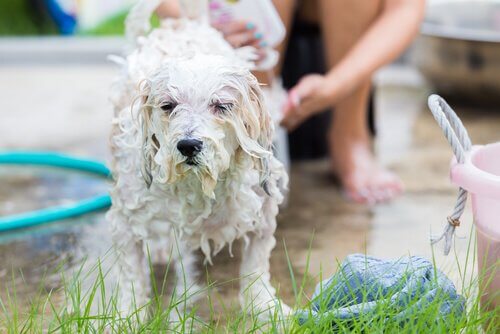Find the Best Dog Shampoo for Your Pet

Finding the best dog shampoo is important and depends on the type of coat and skin of your dog. As a result, you’ll avoid irritations and be able to easily brush the fur. Read below to find out how to choose the best option to clean your dog.
The right shampoo for your dog

The first thing to consider is that, no matter how great your own shampoo is, you shouldn’t use it on your dog. If you do, it’ll cause irritations on the dog’s skin. This is due to the fact that the pH of a dog’s skin is different from that of humans. So, what’s good for one is not good for the other.
Dogs require a specific product for canines. Since each dog’s body is unique, you’ll need to find the right shampoo for him. The shampoo you choose depends on the length and type of fur, as well as the characteristics of the skin.
Your veterinarian is the best person to advise you on the type of shampoo necessary for your pet. Additionally, he or she can also offer tips on bathing your dog correctly.
Just like humans, dogs need different types of shampoo according to their type of skin and coat. Your veterinarian will know the best products to use for bathing your pet.
There are more and more products for pets on the market, which make our head really spin. For starters, we need to choose a quality shampoo that avoids harming the fur and skin of our dog.
For example, we can begin with a generic product. Then, with the help of a veterinarian, we can narrow it down to a specific shampoo for our pet. For example:
- For dogs with long fur, we should look for a product with a detangling agent so that we can easily brush the fur.
- Animals with short hair will need a product that has nutrients for the skin.
- Dogs with dark colored fur will benefit from a shampoo that has aloe vera. This type of product is also useful for itchy skin.
Other varieties of dog shampoo that you can use
There are other options to consider when deciding on the best dog shampoo:
- Anti-thinning shampoo: for animals that tend to lose a lot of fur.
- Dogs with white fur: prevents fur from turning yellowish.
- Oatmeal shampoo: for dogs with dry and scaly skin, dander, and mild allergies.
In addition, every once in a while it’s good to shampoo your dog with a product that is anti-parasitic to eliminate fleas and ticks.
Tips when bathing your four-legged friend
When giving your dog a bath, remember that after shampooing, it’s important to rinse him thoroughly. After this, don’t forget to brush your pet well so that the fur looks beautiful.
And, if you want your dog to look really special, there is an inexhaustible selection of products on the market. These include detanglers, creme rinses, and conditioners in order to make your dog look beautiful.
If you have a dog groomer that bathes your pet, make sure that person is using the best dog shampoo for his fur and skin type by giving precise instructions. This will ensure that he doesn’t have any type of irritation and the fur has a nice sheen.
Make sure that your dog likes the shampoo that you choose

After all of these considerations, take into account your dog’s opinion. Some shampoos may have a very unpleasant odor to your dog, even though they may smell wonderful to you. Remember that we’re a different species so we don’t necessarily have the same tastes.
As we know, the sense of smell of canines is extremely developed. So, what for a human is a mild fragrance, may seem excessive and a potent aroma for your dog.
Therefore, don’t expose your four-legged-friend to odors that may be unpleasant to him. Closely observe how your dog reacts to the shampoo that you use, even if it comes with all the guarantees and recommendations imaginable.